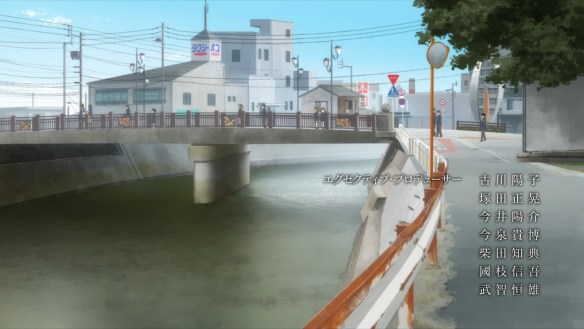Hello folks, and welcome back to Wrong Every Time. Today we’re embarking on another long walk off a short pier, as we commence the third season of Yuki Yuna is a Hero, the aptly named “Hero Chapter.” Once again, a squadron of compassionate, idealistic young girls will be thrown into relentless battle, fighting and dying so that a dispassionate divine entity can continue its war against the forces of entropy. There is no victory in this battle; the only certainty is a continuous escalation of conflict, to the point where our heroes will eventually sacrifice themselves willingly to give humanity one more day, one more hour of peace under the boughs of the Divine Tree.
Yeah, it’s a pretty brutal franchise on the whole, made all the more so because it’s so effective at illustrating the poignant bonds between its leads, and how their civic-minded decency could do so much within their own communities, if they weren’t being consigned to such an arbitrary, anonymous fate. Though it could easily come off as exploitative, its genuine celebration of all that is good about its protagonists makes it feel far more angry, angry that they are forced to live in such a world, that just like in our own, the light of human kindness can be so grossly exploited by social convention, patriotism, and religion. Battered and beaten as we are, we still work to make the load lighter for each other, still practice charity in the face of oblivion. Let’s return to the fight!
Episode 1
As usual, we open on a procession of mundane establishing shots establishing the slow pace of life in Yuna’s town, articulated in the same muted greys and earth tones that this franchise always uses for its cooldown montages, all emphasizing the sleepy normalcy of the town at rest. The wild color design of the Divine Tree’s world is this franchise’s most dramatic visual flourish, and key to that image’s impact is the contrasting band of pastels that signify our own world. The town appears peaceful but not necessarily inviting; it’s scenery you’d take for granted, not knowing the cost of its protection
Yuki Yuna’s maintained basically the same core staff so far, so the franchise has a strong sense of aesthetic continuity at this point. A risk you can run with changes in staff and studio; one production team builds up a set of visual signifiers that another won’t necessarily abide by
And hey, here’s Yuna herself checking in at the hero club. So it seems this one is a direct sequel, implying Togo might have to suffer through a third gauntlet as hero. There is no retirement but Nogi’s prison for a useful soldier, apparently
A brief montage demonstrates them participating in the same sorts of civic charity works that the hero club prioritized initially. Even though Fuu recruited the team at the Divine Tree’s behest, the work they were initially doing as a “cover” is actually the true, fundamental practice of being a hero in society, and it is delightful to see that their commitment to making their town brighter has survived their exploitation as warriors
Aw shit, it seems Togo isn’t here, while Nogi of all people is a familiar member of the club. Well, it wouldn’t be Yuki Yuna without some excruciating examples of dramatic irony, where us in the audience are all gritting our teeth and waiting for the hammer to fall. So what happened to Togo?
Yuki and Nogi are of course very compatible characters. Hard to imagine disliking either of them
Fuu’s “we’re all here, right,” offers a graceful clarification, confirming that Togo truly isn’t a part of the club
“Spectacular Days.” Yep, every season’s gotta start with a bunch of charming slice-of-life escapades. Of course, the reason the show’s later drama works is because it invests so convincingly in these characters and their lives; they are not purely defined as victims in some horror movie, they are multifaceted characters with deep ties to each other and the community around them
“Zero is nothing.” Granted, that doesn’t mean the team is above baiting our expectation of tragedy with dramatic cuts and portentous non-sequiturs like this
The sisters remark on how Nogi is more dependable than you’d expect, a contrast we came to know well in Washio Sumi
“Too many things happened since I entered third year.” Fuu continues to be our vehicle for clarifying the details of this timeline, with her reflections here clarifying that the events of the first season did indeed happen, at least in some form
I wonder if Togo made some sort of deal with the Divine Tree, to protect those precious to her from martial responsibility at her own expense. If so, she would certainly have asked to have herself erased from their memories, knowing they’d otherwise attempt to save her. That sounds like an extremely Togo thing to do
We flash back to Nogi joining the club, with Karin of course starstruck by this “legendary hero”
Nogi immediately sets to work cooking up fresh nicknames, just like in Washio Sumi. This sure is an odd sort of crossover episode
“This is how you guys have been enjoying your youth.” Nogi the grizzled middle school veteran
Even Nogi’s bedridden phase took place in this world, but she apparently just “recovered” over time
“Well, I just happened to be free today.” Karin still playing it cool, I see. I suppose we only change so much
Our first inkling of discord comes as Karin and Yuna walk home, and Yuna finds her eyes drawn to a passing girl in a wheelchair. Something is missing in her reality, but she’s not certain what
And Fuu offers the next, cutting an extra slice from their cake “out of habit.” This prompts another memory fragment from Yuna in turn, who almost recalls how they would look forward to Togo’s gourmet sweets
Ooh, love this watercolor-reminiscent shading as we cut to Yuna walking home. You can actually do a lot with CG templates and altered photography, so long as you make sure to fill those outlines with color spreads that actually feel textured and worn with age, rather than just clean block colors
Yuna stops before Togo’s house; she can’t consciously remember her, but her subconscious carries her here
Meanwhile, Nogi visits the shrine by the ruins of the bridge, offering flowers at Gin’s marker. Her conversation further emphasizes the tragedy of Togo’s situation; even though Gin died, she is at least remembered, still treasured by her friend. Togo doesn’t even have a stone marker
“I’m going to do an excellent job as a tree.” Nogi participating in a noble tree-playing anime tradition for their next play. God, K-On! got such incredible mileage out of that concept
She offers a gift of the noodles Gin herself taught her to make. A representation of Gin’s kindness carrying on in her absence – a tangible reflection of her ordinary human decency, the way she ought to be remembered. Again, another cruel contrast with Togo, whose noble yet mundane qualities like her talent for sweets have been largely forgotten
It’s a theme strong enough to serve as this show’s enduring thesis: we are at our best engaging in simple acts of kindness towards each other, not being exploited for the ostensible “glory” of our societal overseers. Heroism is embodied on the local level of compassion and civic responsibility, not in our willingness to engage in combat or sacrifice ourselves for some distance cause
And of course, Nogi also made an extra helping
Nogi cries for a friend she cannot recall
“I guess we’ll have to do this without the tree today.” Oh no, how will the performance endure
Once again, Itsuki fills in the role Togo previously played as narrator, a choice that quietly emphasizes how she was always stronger than she believed
But hearing “no one knew the hero was all alone” jogs Yuna’s memory – a line she can recall in Togo’s voice, and which now apparently applies to Togo herself, wherever she has been sent
And so the memories come flooding back, along with the tears. These kindergartners are getting a pretty avant-garde interpretation of The Hero and the Demon King
So we’re basically doing a Search for Spock, a movie that has only lodged in my memory because Bruce Coville aped its title for one of the dozens of books he wrote and I devoured as a kid
The other girls are caught in a spinning dutch angle shot as they realize Togo’s missing, a classic trick for conveying a sense of queasy disorientation, as it messes with our sense of stable perspective in the same way a rocking boat might
We then cut to a reprise of Nogi’s introduction to the club, this time with Togo in attendance
Itsuki draws the “circle of fate” tarot card, which she interprets as a fateful encounter. It seems like the “circle” is more important than the “fate” here though – perhaps a hint that none of them can escape their destinies
Oh god, Togo is still doing the National Defense Mask thing. Truly a land of contrasts, that Togo
Unsurprisingly, Yuna is a huge fan, and was in fact saved by the National Defense Mask just yesterday. The two really are a matched pair
Apparently Togo is wracked with guilt for having destroyed part of the wall. I suppose it’s just in her nature to worry and sacrifice herself, but goddamnit, she earned that rebellion. She was right!
So presumably, however she ultimately decided to “atone” has resulted in this world where she doesn’t exist – or as we see next, where she is apparently burning in some kind of eternal flame
And Done
Goddamnit, Togo! You have suffered more than enough, and you had every right to rebel against the Divine Tree’s dictates. But as always, one of the signature cruelties of this franchise is that the Divine Tree, horrible as it is, is indeed our only defense against the ravenous gods that have consumed the rest of the universe. We are caught in a conflict between forces so far beyond us we cannot even recognize them as sentient, celestial monstrosities for whom our existence is barely noticeable, yet without whom we would be instantly consumed by the tide. Yuki Yuna’s cosmic horror serves as an enduring counter to its intimate humanism, evoking a fatalism that goes beyond its critiques of nationalism and religion, asking us if our ordinary kindness is still meaningful even if there is no better future awaiting us. Well, I think we can guess Yuna’s answer!
This article was made possible by reader support. Thank you all for all that you do.




